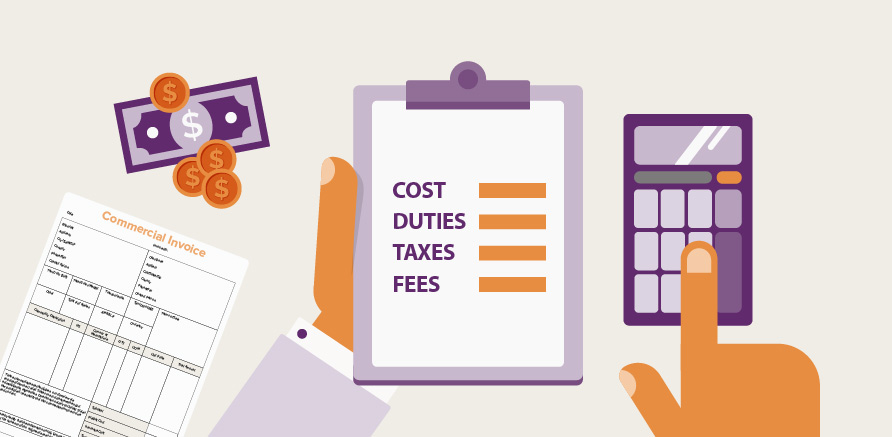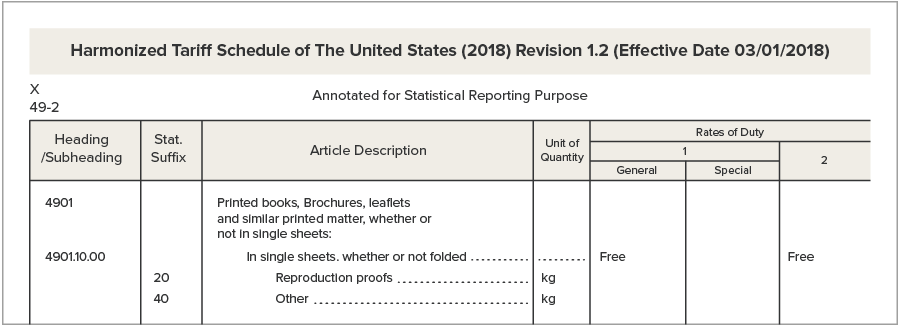Landed Costs
AKA: Landed Fees, Landing Fees
Landed Costs are the total costs involved in shipping a package to an international location. They include the transportation costs and applicable duties, taxes, port fees, customs fees, and any other fees to complete the delivery of the shipment. In this lesson, we'll break down the different types of landed costs your shipments can encounter and show you how you can estimate the landed costs ahead of time.

Determining Landed Costs
Landed costs can often be difficult to estimate but it is doable.
Duties
Duties are essentially a tax that is imposed on your shipment when it is imported into a country. It's different than local taxes (see below).
In order to find out how much duty your items are subject to, you must:
Find the Harmonized Tariff Schedule (HTS) code for the destination country:
The Harmonized Tariff Schedule is a very very big document containing every single product you can imagine and an associated Harmonized System (HS) code to it. The HS codes are fairly similar between countries however, if you want to find out how much duty applies to your items, you have to find the harmonized tariff schedule for the destination country.
HTS for Canada can be found here
HTS for the United States can be found here
Find the HS code for your item:
Once you've got your HTS document, find the HS code that applies to your item. Once found, you'll see beside it the Rate of duty. Simply apply the amount specified based on the quantity and value of your product.

Taxes
Taxes are what the local government would charge had the items been purchased within the country. This may be assessed by at the provincial, state, country, or even municipality level.
Brokerage fees
Some carriers include routine brokerage fees as part of their international service. Others charge for this service. You'll have to find out who the broker will be (this is decided by the recipient) and have them provide you with a quote. Brokerage fees are typically based on the value of the goods and the number of items declared on your CI. Sometimes there are extra fees such as advancing the payment to the local government, a bond fee, or merchandise processing fees.
Warehousing
This is more tricky to determine as it can depend on the number of days that customs holds your package. If you're concerned about warehousing fees, call a local brokerage house and ask for a quote. Some places include a certain number of days of warehouse time, with a fee after that.
Finding a Broker
You can also reach out to a licensed customs broker in the destination country if you need expertise on the local laws and regulations. Finding the specific quantity of duties and taxes that will be levied on a given shipment can be a difficult undertaking, but by starting with information online and/or contacting an expert, you should be able to find an estimate.

What if Insurance and Customs Values Don't Match?
Shippers sometimes attempt to pay fewer duties and taxes by declaring their items at a lower value than they insure them for, but this is not recommended - customs will often cross reference the figures, and apply penalties if they don't match. Of course, you can always insure a partial value of the shipment, but you cannot insure it for more than the declared value.
Whenever customs detects a discrepancy between the real value and the declared value, they can flag and inspect your shipment more closely, and it's possible that your future shipments will be subject to additional screening delays. Therefore, we recommend always providing completely accurate information.
Protected Markets
Countries often make a significant effort to protect certain parts of their local economies - American textiles, for example, or Italian chocolate. Shipping these goods will often result in specific screening, and they will generally be subject to unique regulations, such as higher tax rates or limits on the amount that can be imported. In some cases - notably ball-bearings entering the US - customs will intentionally hold products for an extra business day.
Summary
Duties and taxes represent a large portion of shipping costs, but it's not always easy to know how much you'll have to pay. Knowing the basics of landed costs and how to determine them is a great step in the right direction. The next step in our learning center is Shipping 205, which is on the responsibilities of international shipping.

